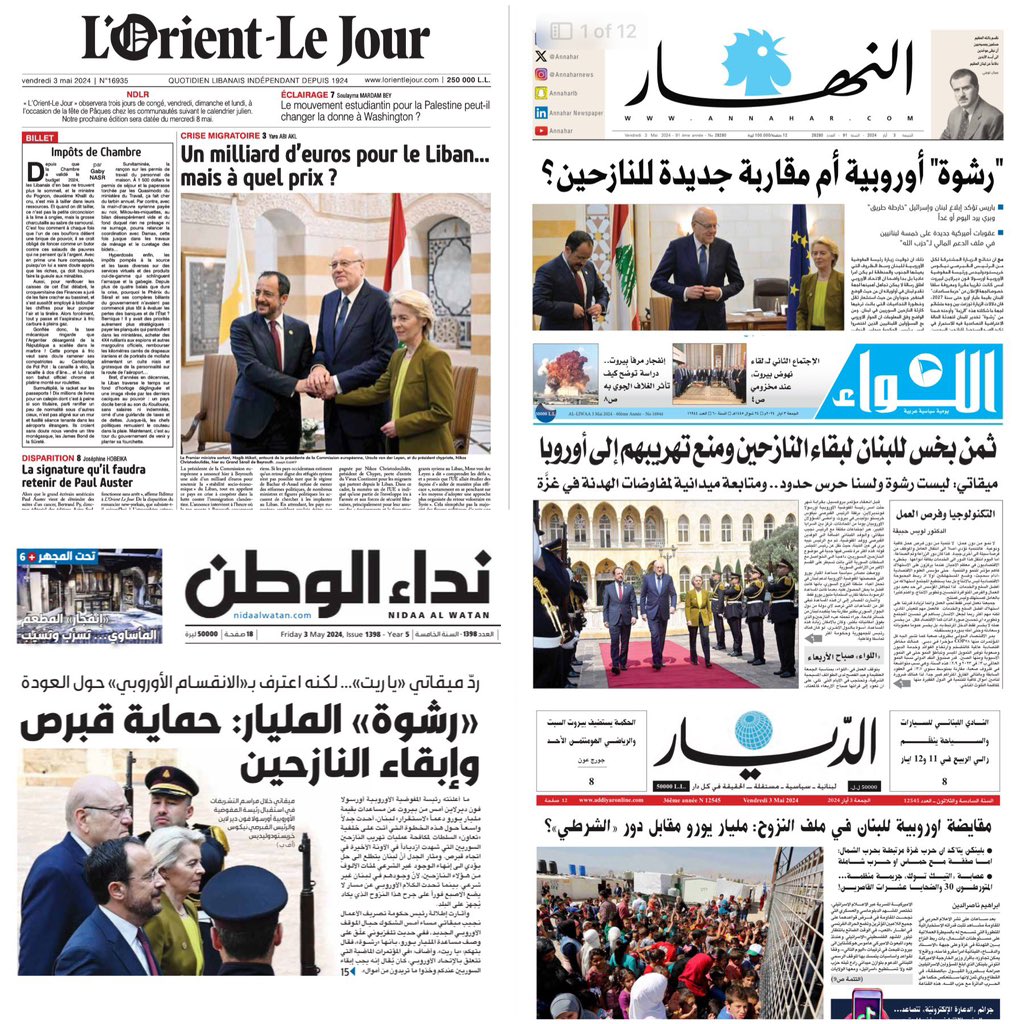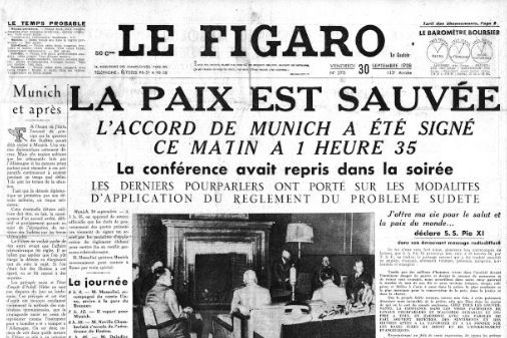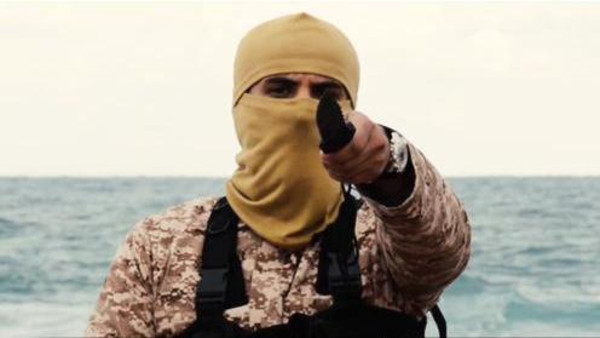Yesterday, Ursula Von Der Leyen informed the Lebanese that she would give one billion euros over four years in order to keep the Syrian migrants on Lebanese soil from reaching Europe. This, bearing in mind that everything is being done by herself and by the Western powers to prevent those migrants from returning to Syria.
Syrian migrants cost Lebanon $4.5 billions a year. However, Lebanon’s Prime Minister Najib Mikati, whose mandate expired in October 2022, and who who therefore illegally exercises power, bowed low and said: “Yes Maame. Syrians who want to go back to their country may go, and those who stay in Lebanon will stay”.
Such was the most recent blow dealt by the friendly nations to Lebanon. In only a few decades, they destroyed a nation that had resisted for 1,400 years against the forces of Arabism, Turkism, and Islamism. They did everything they could to make Lebanon lose its identity: supporting the political marginalization of the country’s Christians, supporting puppet-politicians named by the enemy, who altered the country’s demographics by illegal naturalizations, to the extent that it became possible to call Lebanon an “Arab country” and a “Muslim country” for the first time in history.
And now, this, the final nail in Lebanon’s coffin: 2.1 million Moslem Sunni Syrian migrants and more than 400,000 mainly Sunni Palestinian refugees are to remain in Lebanon, imposed, while the number of the Lebanese residing in the country is around 4 million. The remainder of the Lebanese population were kicked out by massacres, war, poverty and despair. You can now find them in Paris, London, the US, Canada, Latin America, Africa, the Gulf, or anywhere else but in their own country.
So here are a billion euros, to forever change Lebanon’s demographics and prevent any possibility of economic recovery.
One billion? Is this a joke? According to the World Bank, the presence of the Syrians costs Lebanon $4.5 billion per year, including one billion directly, and $3.5 billion indirectly. If we do the math, that’s $63 billion since 2011. As the Lebanese public debt was $102.7 billion at the end of September 2022, it is easy to understand why Lebanon defaulted on its debt, and why its economy crashed, Venezuela style. Load the donkey more and more, make it carry four times its weight, hit it, pull it right and left as you want, it will end up dying.
When the Cedar falls, it will bring down the entire world structure with it. Indeed, agreements like that of Munich have a flaw: their consequences, just like a boomerang, always come back to strike those who concocted them in the first place.
To be clear, Lebanon did not fall because it was weak, but because it was betrayed. Its gradual collapse brought about the just-as-gradual spread of Islamism across the globe, because betrayal was the price paid under the table by the West for cheap petroleum, and for those very lucrative arms deals which Western leaders boasted about in front of television cameras.
Put yourselves in the shoes of the oil powers. For 1,400 years, they have been lusting after Lebanon which they saw as the pearl of the Middle East and the world. For them, not only was its beauty beyond compare, its water abundant and its climate agreeable, but it was also the place of refuge of those who had escaped their tyranny and had to be put to death, according to their law.
Lebanon is made up of the remnants of the nations that were destroyed by the successive califates. Together, these resistance fighters in Lebanon formed a barrage, a rampart, a watch tower that protected the West from Islamism, and from its material and intellectual terrorism. Lebanon was the first to take the blows, the bulk of which it absorbed and defeated; and it kept springing to its feet, even though false information or heftily paid propaganda peddled a gloomier narrative.
Lebanon’s incredible longevity speaks for itself. This nation has resisted hundreds of massacres, and even genocides at times, without ever losing its identity in an ocean of Islam; welcoming the remnants of the nations, wave after wave, thus returning good for evil to those that fought it when they were strong.
Lebanon can absorb real refugees, but not communities that have been waging in their countries a Jihad war against minorities for decades. This is the case of the majority of Palestinian and Syrian refugees in Lebanon.
In Palestine, a Jihad war was officially declared by the Grand Mufti in 1936. The 1947 war was a part of that Jihad, which was never revoked, and was led by the Islamist Sunni Palestinians.
When the latter came to Lebanon, they soon resumed the same kind of war, but against the Christians and the Lebanese Authorities. Even in the 1970s, when they called themselves leftists, they used the cry of Jihad (“Allahu akbar!”) when fighting the Christian neighborhoods and the Lebanese army.
As for the Syrians, they lived, since 1963, in a permanent state of Jihad, waged by the Sunni Islamists under the banner of the Moslem Brothers. At the peak of this war, hundreds of minority members, especially Alawis, were targeted and killed every year, either individually or in collective attacks. A huge repression ensued–and this was used by the Syrian Moslem Brothers’ propaganda in their calls to implement Sharia law, and to exterminate Alawis.
In 2011, when the Syrian war broke out, the opposition wasn’t only islamist and djihadist. It included also important intellectual and secular figures. Before long, however, the jihadists took the reins, thanks to money flowing from the Arab Gulf, and the jihad war that had already been taking place in Syria for decades. They got rid of the secularists, and the Syrian opposition became Islamist.
Many Syrian Sunnis are patriotic and loyal, but these have remained in Syria. Those who are in the camps of migrants in Lebanon mainly belong to the Syrian opposition. In 2011, there was important intellectual personalities opposing the regime, but thanks to money from the Gulf, the jihadists (Free Syrian Army, etc.) quickly took control of the situation, pushing aside the intellectuals. The Syrian opposition is now almost exclusively Islamist, with Daesh and Al-Nusra–and to a lesser extent the Syrian Free Army (SFA)–as its main leaders.
These two organizations are still present on the ground. They commit attacks. They recruit in Syria and Lebanon. Anyone of them–or any other Syrian or Palestinian jihadist organization with prestige and money–could recruit an Islamist army larger than the Lebanese one, just in the Syrian migrant camps. For at least 100,000 to 200,000 of these migrants have received military training in Syria, either as conscripts, or in jihadist organizations. Besides, it’s easy to train new recruits, as proven by the Syrian war itself.
But instead of facing this danger, the international community has simply decreed the death of Lebanon: Islamists will neither go back home nor migrate to Europe (even though it was not Lebanon that bombed their countries, but the Western powers). And Lebanon does not sell migrants as slaves, as was the case in Libya.
Now, it seems that all is over. As the Osservatore Romano said at the beginning of the Lebanese war: “If Lebanon dies, it will have been murdered.”
The consequences, however, will be terrifying. Indeed, if Islamism has been already able to strike the West in such a violent way by rushing into the breaches of the Lebanese dam, what will it do when this dam breaks and the flood is unleashed in full force?
Lina Murr Nehmé




